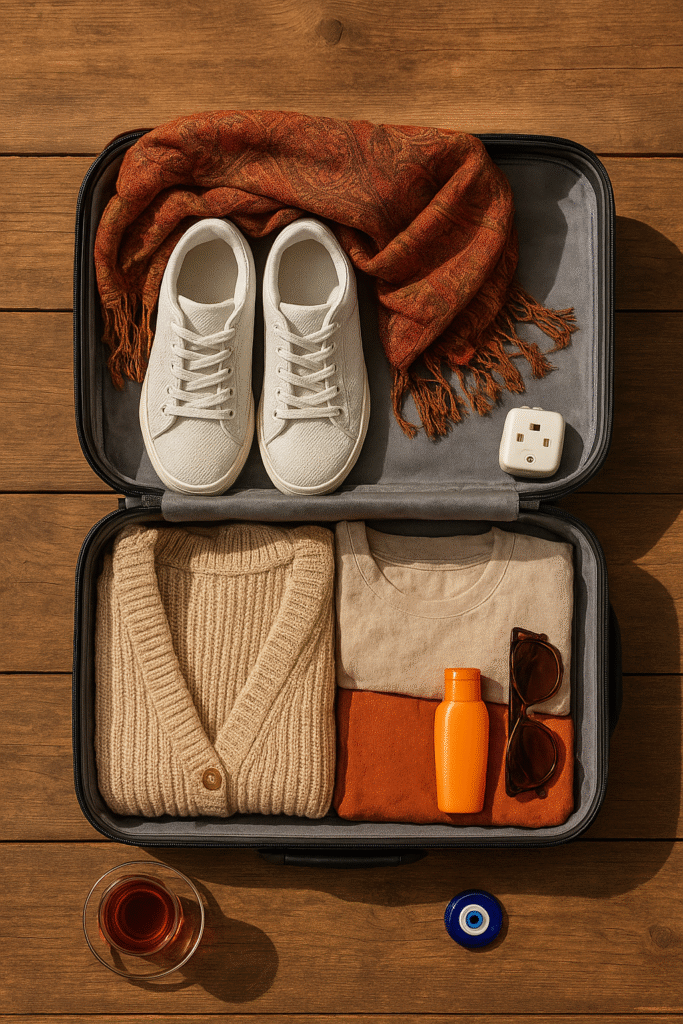Heading to Turkey? – A Real Traveler’s Guide
Hey fellow travelers! 👋

So, the tickets are booked, the hotels are sorted, and the excitement is kicking in. But now you’re staring at your empty suitcase thinking, “What on earth do I pack?”
Turkey is a bit of a trickster when it comes to packing. It’s not a “one size fits all” kind of country. You might be melting in Antalya one day and shivering in the mountains of Erzurum two days later.
Don’t worry! I’ve combined all the essential tips (plus some hard-learned lessons) into this guide to save you from overpacking—or worse, wishing you had brought that one thing you left at home.
Let’s dive in!
1. The Weather is Moodier Than You Think (Regional Tips)
Don’t assume the whole country is hot and sunny. Depending on where (and when) you go, you need a strategy:
- The Aegean & Mediterranean (Bodrum, Antalya, Kas): If you are going in summer, one word: HOT. And humid. The kind of humidity that makes clothes stick to you.
- Pack: Linen, light cotton, loose dresses. Avoid synthetics like the plague.
- Lifesaver: A portable hand fan (electric or manual). Trust me, when you’re waiting for a bus in 35°C (95°F) heat, this little gadget is a game-changer. Also, throw in a small face towel to dab away sweat.
- The Black Sea (Trabzon, Rize): It’s incredibly green for a reason: Rain. Even in July, a downpour can hit out of nowhere.
- Pack: A lightweight, quality raincoat and water-resistant shoes are non-negotiable here.
- Central & Eastern Turkey (Cappadocia, Kars): Think “desert climate.” The sun roasts you during the day, but the temperature drops sharply at night.
- Pack: T-shirts for the day, but you must bring a hoodie, cardigan, or light jacket for the evenings. If you visit in winter, bring full thermal gear (base layers, wool socks)—it gets properly freezing!
2. The “Shoe Situation” (Please Read This!)
If you only remember one thing from this guide, let it be this: Turkey is a walking country, and it is also a “graveyard for high heels.”
Whether it’s the ancient cobblestones of Istanbul, the marble streets of Ephesus, or the dusty trails of Cappadocia, your feet will be tested.
- The Golden Rule: Leave the heels and the flimsy, flat-soled sandals at home. Bring your most comfortable sneakers. You will likely clock in 15,000+ steps a day. Your feet will thank you later.

3. Mosque Etiquette & The “Sock Hack” 🕌
You’ll definitely want to visit iconic spots like the Blue Mosque or Hagia Sophia. Since these are active places of worship, you need to be prepared.
- For the Ladies: They do lend scarves at the entrance, but thousands of people use them… If you prefer your own hygiene (and want to skip the line), pack a lightweight scarf or pashmina in your day bag. You can just wrap it around your head and walk right in.
- Dress Code: You can’t enter with short shorts or mini skirts. If you plan to visit a mosque that day, wear a maxi dress or loose linen trousers.
- The Sock Hack (Crucial!): In summer, you’ll likely be wearing sandals. However, you must take your shoes off to enter a mosque. Walking barefoot on carpets where millions have walked? Eh.
- Tip: Keep a fresh pair of socks in your bag. Slip them on before you go in, and take them off when you leave. It’s cleaner and more respectful.
4. Health, Meds, and Hospitals 💊🏥
Hopefully, you won’t need this section, but it’s better to be safe than sorry.
- Pharmacies (“Eczane”): Look for the big red “E” signs. They are everywhere. Turkish pharmacists are generally very well-trained and helpful. For minor issues (upset stomach, cold, allergies), you can often consult them directly without seeing a doctor.
- Antibiotics: Unlike some countries where you can buy them over the counter, antibiotics are strictly prescription-only in Turkey. If you are prone to specific infections, bring your meds from home.
- Hospitals: The healthcare system in Turkey is excellent. Private hospitals often have 5-star hotel standards and are very modern. In an emergency, dial 112.
- Water: Don’t drink tap water. It’s usually treated, but the taste is strong and might upset sensitive stomachs. Stick to bottled water (it’s cheap and everywhere).
5. Don’t Blow Up Your Hair Straightener! 🔌💥
I’ve seen this happen too many times. Turkey uses the standard European Type F plugs (two round pins) and operates on 220-230 Volts.
- Travelers from USA/Canada/Japan: Your devices likely run on 110V. If you plug your hair straightener or electric shaver directly into a Turkish wall socket, it might literally pop and smoke. 💥
- Check your device: If the tiny text says “Input: 100-240V,” you are safe (you just need a plug adapter).
- If it says “110V only”: You need a voltage converter, not just a plug adapter.
6. Safety & The Perfect Bag
Istanbul is generally very safe—much safer than many major US or European cities. However, pickpockets exist in crowded tourist areas (like the Trams or the Grand Bazaar).
- Leave at home: Open “tote bags” without zippers. They are an easy target.
- Bring: A cross-body bag with a zipper. Keep it in front of you in crowds. If you carry a backpack, use small luggage locks on the zippers for peace of mind.
Turkey is an incredibly hospitable and beautiful country. Pack smart, and you’ll have the time of your life!
Safe travels! 🧿

